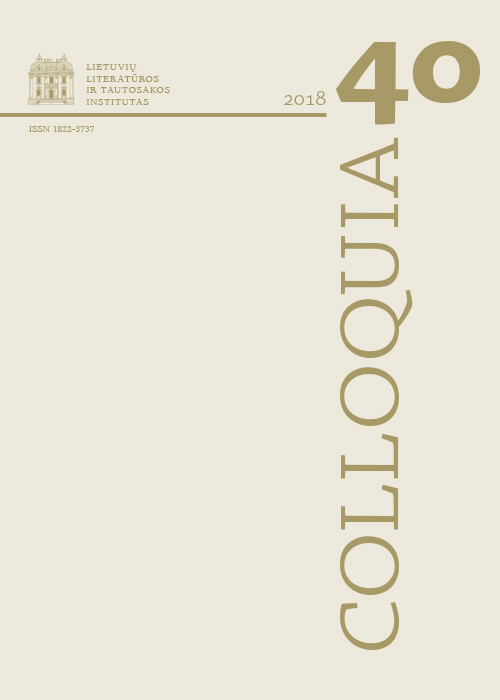Reading With Attuned Ears: Music in the Plays of Kostas Ostrauskas
Abstract
The author of this article surveys and systematises the many manifestations of music in the texts of Lithuanian playwright and pioneer of absurdist and postmodern drama, Kostas Ostrauskas (1926–2012). Ostrauskas’s drama talks about music and cites it, turns famous figures of the music world into characters and the reader into an active performer, forcing the audience to see (and “hear”) music in various shapes and forms.
To explore this dynamics, the author of the article draws on the classification of musico-literary connections developed by intermediality theorist Werner Wolf, which was in turn based on Steven Paul Scher’s triadic typology: a) music and literature; b) literature in music; and c) music in literature.
The references to music that can be found in Ostrauskas’s works “illustrate” all of the variations and forms of the interplay between literature and music outlined by Wolf and Scher. The reader of Ostrauskas’s plays is invited to adopt an attitude more active than usual: emphasis is primarily on the plane of expression, as the plays are oriented towards the active reader-performer’s eyes and “ears” (presentation, visuality, plasticity).
The systematisation of the connections between music and literature makes it possible to argue that Ostrauskas’s drama examines questions related to the specifics of both media.
Downloads
Most read articles in this journal
- Dalia Satkauskytė, Contemporary Literary Criticism: The Challenges of Democratisation , Colloquia: Vol. 51 (2023): Colloquia
- Giedrė Ivanova, Music in the Works of Ignas Šeinius: A Few Chords , Colloquia: Vol. 49 (2022)
- Ieva Šakelaitė, Emancipatory Poetry: The Žemaitė Square Readings as Feminist Artivism , Colloquia: Vol. 52 (2023): Colloquia
- Iveta Leitane, Gastro-Poetics in Lithuanian Yiddish Literature of the Interwar Period: The Early Work of Moyshe Kulbak (1896-1937) , Colloquia: Vol. 49 (2022)
- Jūratė Jasaitytė, Preserving the Dance: R. M. Rilke’s Concern for the Preservation of Objects and its Reflection in Lithuanian Poetry , Colloquia: Vol. 51 (2023): Colloquia
- Jurgita Žana Raškevičiūtė, The Individual and the Holocaust in Icchockas Meras’s Stalemate , Colloquia: Vol. 39 (2017)
- Brigita Daugėlaitė, Kazys Boruta in the Soviet Security Surveillance Case , Colloquia: Vol. 52 (2023): Colloquia
- Justina Sinkevičiūtė, Virginijus Gasiliūnas, Dalia Satkauskytė, Irena Balčiūnienė, Manfredas Žvirgždas, Giedrė Kazlauskaitė, Šiandieniai Vinco Mykolaičio-Putino vertinimai , Colloquia: Vol. 51 (2023): Colloquia
- Jānis Oga, Magical Realism under the Soviet Occupation: The Case of Zigmunds Skujiņš , Colloquia: Vol. 51 (2023): Colloquia
- Laima Laučkaitė, The Iconography of Jewish Vilna during the First World War , Colloquia: Vol. 48 (2021)




